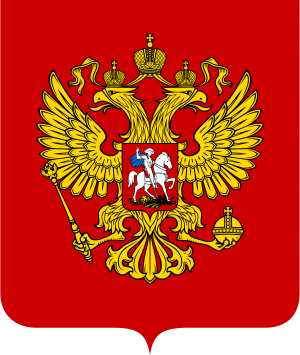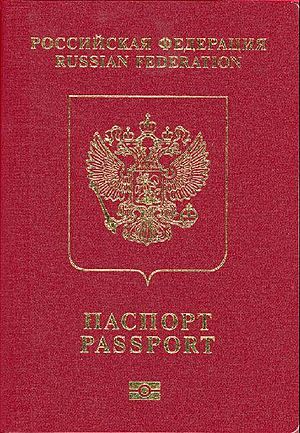Russian citizenship law facts for kids
Quick facts for kids On Citizenship of the Russian FederationО гражданстве Российской Федерации |
|
|---|---|
 |
|
| Federal Assembly | |
| Citation | N 62-ФЗ |
| Territorial extent | Russia (including Crimea), Ukraine |
| Enacted by | Federal Assembly |
| Date signed | 31 May 2002 |
| Signed by | President of Russia |
| Date commenced | 1 July 2002 |
| Status: Substantially amended | |
Russian citizenship law explains how someone becomes a citizen of Russia. The main law about this is called "On Citizenship of the Russian Federation." It started on July 1, 2002.
If you are born in Russia and at least one parent is Russian, you are a citizen. If you are born outside Russia to two Russian parents, you are also a citizen. People from other countries can become citizens. They usually need to live in Russia for five years. They also need to show they have a job and can speak Russian.
Russia used to be part of the Soviet Union. Everyone living there was a Soviet citizen. After the Soviet Union broke up, each new country made its own citizenship laws. People from former Soviet countries can sometimes become Russian citizens more easily. They might not need to meet all the usual rules.
Contents
How Russian Citizenship Works
The Constitution of Russia talks about citizenship. Citizenship means you belong to a country. It also means you have certain rights and duties in that country.
In Russia, citizenship is different from "nationality." Nationality usually means your ethnic group. For example, you could be a Russian citizen but have Ukrainian nationality. Old Soviet passports used to show a person's nationality. Modern Russian passports do not.
History of Russian Citizenship
Early Russian Subjects
Long ago, people in the Tsardom of Russia and Russian Empire were called "subjects." They were loyal to the Russian ruler. To become a subject, people often had to be baptized into the Russian Orthodox Church.
Later, foreigners who wanted to become subjects had to promise loyalty to the ruler. This promise changed over time. In 1864, new rules were made. People usually had to live in Russia for five years. This rule could be shorter for special people. This included scientists or those who helped Russia a lot. This is when the word "citizenship" started to be used.
Russian women who married foreign men used to lose their Russian subject status. If they became a widow or divorced, they could ask to get it back. People who became citizens of another country without permission could be punished. They might lose their rights or be sent to to Siberia.
Citizenship in the Soviet Union
After the October Revolution in 1917, the new government changed everything. They wanted communism to be a worldwide movement. So, it was easy for foreigners to become Soviet citizens. Local councils could grant citizenship. This was especially for farmers and workers.
However, the government could also take away citizenship easily. This was to stop "enemies of Soviet power." In 1922, the Soviet Union was formed. Every person in the USSR was a Soviet citizen. They were also citizens of their local republic, but this was mostly symbolic.
The Soviet Union had different rules for women. Soviet women who married foreign men could keep their Soviet citizenship. In 1938, a new law defined who was a Soviet citizen. It said citizens were those who were Russian subjects in 1917 and had not lost citizenship. Others had to get it legally. People who did not have Soviet or foreign citizenship were called stateless.
The 1977 Soviet Constitution said that Soviet citizens would be protected abroad. A new law in 1978 said Soviet citizens could not be sent to other countries. It also said people could not have multiple citizenships. This was seen as a sign of disloyalty.
In 1990, the rules changed again. It became harder for the government to take away citizenship. It could only happen if someone joined a foreign army or lied to get citizenship.
After the Soviet Union
When the Soviet Union was ending, Russia made new citizenship laws. These laws followed the Universal Declaration of Human Rights. It became much harder for the government to take away citizenship. Also, having more than one citizenship was allowed if Russia had an agreement with that country. This new law started on February 6, 1992, after the dissolution of the Soviet Union.
Many former Soviet citizens living in Russia on February 6, 1992, automatically became Russian citizens. They could refuse this if they wanted. Other former Soviet citizens could become Russian citizens easily if they moved to Russia by 2000.
Dual Citizenship and Former Soviet States
After the Soviet Union broke up, many ethnic Russians lived outside Russia. Russia signed agreements with countries like Turkmenistan and Tajikistan. These agreements made it easier for people to have dual citizenship. Russia also made it simpler for people from Kyrgyzstan and Kazakhstan to become Russian citizens.
The idea was to help Russians living abroad feel safe. But other countries worried about Russia's influence. Many people who used these easy paths were not ethnic Russians. They came from countries that relied on Russia economically.
Around 2000, it became harder to get Russian citizenship easily. The new law in 2002 made the process stricter. People had to speak Russian, show they had a job, and give up their old citizenship. They also had to live in Russia permanently first. This made it take much longer to become a Russian citizen.
After 2014, Russia started to encourage dual citizenship again. This was especially true for people in some former Soviet countries. For example, Ukrainian citizens no longer needed to give up their Ukrainian citizenship to become Russian. This was also true for people in certain parts of Ukraine. In 2020, the rule about giving up foreign citizenship was removed for everyone. After the 2022 Russian invasion of Ukraine, it became even easier for people in Ukraine to get Russian citizenship.
Eurasian Integration
Russia and Belarus formed the Union State in 1999. Citizens of both countries automatically have Union State citizenship. This lets them vote in Union State elections. They can also live and work in either country easily. This freedom of movement was later extended to all countries in the Eurasian Economic Union (EAEU) in 2015.
Becoming and Losing a Citizen
If you are born in Russia and at least one parent is Russian, you are a Russian citizen. If you are born in Russia to two foreign parents, you become a citizen only if you cannot get citizenship from your parents. Children born outside Russia to two Russian parents are also citizens. If only one parent is Russian, the child becomes a citizen if they would otherwise be stateless. Abandoned children found in Russia are usually considered Russian citizens if their parents are not found in six months.
People from other countries can become Russian citizens. They usually need to live in Russia for more than five years with a special permit. They must speak Russian and have a legal job. This time can be shorter for people who have asylum or are refugees. It can also be shorter for those who have done great things for Russia. The president of Russia can also give citizenship to anyone he chooses.
Some groups of people can get Russian citizenship more easily. They do not need to meet the minimum residence time. This includes people with a Russian parent living in Russia. It also includes former Soviet citizens who live in a post-Soviet country but have not become citizens there. People who studied in Russian schools after July 1, 2002, can also apply easily.
Other people who can apply easily are:
- Former Soviet citizens born in the Russian Soviet Federative Socialist Republic.
- People married to a Russian citizen for at least three years.
- Disabled people with an adult Russian citizen child.
- People with a Russian citizen child whose Russian spouse has died or cannot be a parent.
- People with a Russian citizen child over 18 who has been declared mentally unable to care for themselves.
You can give up Russian citizenship by making a statement. Parents can also give up citizenship for their children. If Russia gives land to another country, people living there can choose to keep Russian citizenship or become citizens of the new country.
See also
 In Spanish: Ciudadanía rusa para niños
In Spanish: Ciudadanía rusa para niños


